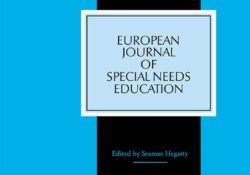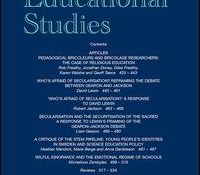tandfonline.com har udgivet en rapport under søgningen “Teacher Education Mathematics”: Leading dissemination of digital, science-based innovation in school – a case study Link til kilde
Like this:
Like Loading...
tandfonline.com har udgivet en rapport under søgningen “Teacher Education Mathematics”: Immersive virtual reality (VR) for digital media making: transmediation is key Link til kilde
Like this:
Like Loading...
tandfonline.com har udgivet en rapport under søgningen “Teacher Education Mathematics”: ABSTRACT Formulae display:?Mathematical formulae have been encoded as MathML and are displayed in this HTML version using MathJax in order to improve their display. Uncheck the box to turn MathJax off. This feature requires Javascript. Click on a formula to zoom. ABSTRACT This paper explores the relationship between students’ digital competence acquisition, teaching practices, and teacher professional learning activities. We analysed insights provided by 59,452 teachers through SELFIE, an online self-reflection tool for schools’ digital capacity. Using ordinary least squares regressions with school fixed effects, we focus on students’ digital competence and find that the use of digital technologies in cross-curricular projects is the teaching practice most related to the acquisition of students’ digital competence. On the other hand, we… Continue Reading →
Like this:
Like Loading...
tandfonline.com har udgivet en rapport under søgningen “Teacher Education Mathematics”: ABSTRACT ABSTRACT The phenomenon of digital differentiation, or stark variations in ability to access Internet hardware and/or infrastructure, has been a feature of provision since its early days. This article explores the impact of digital differentiation on two groups of young people, in England and Germany. It is based on fieldwork that took place during the academic year 2018-2019, just before the global pandemic threw the issue of equality of Internet access into sharp relief. The article begins by describing the empirical design of the My Life Online project, including background, sampling, instruments, ethical aspects and the initial data analysis approach taken to ensure reliability and validity. It then develops a further analysis drawing on Halford and Savage’s hybrid Bourdieu/Actor… Continue Reading →
Like this:
Like Loading...
tandfonline.com har udgivet en rapport under søgningen “Teacher Education Mathematics”: ABSTRACT ABSTRACT The beginning of primary education is an important time to form a good basis for students to develop their digital competence. However, the use of digital technologies is seldom a part of everyday schoolwork during the first years of primary school education. Furthermore, instruction on digital competence is often loosely connected to the students’ own ideas. Since there is obviously a need to investigate student-initiated involvement, this case study examined six to seven-year-old children’s views and ideas of using digital technology in school lessons through drawings and interviews. The results show that some of the students did not share the idea of using digital technology in their school lessons but most of the students did. In particular, the students expected digital… Continue Reading →
Like this:
Like Loading...

tandfonline.com har udgivet en rapport under søgningen “Teacher Education Mathematics”: ABSTRACT ABSTRACT The school closures during the COVID-19 outbreak triggered ashift towards digital learning. Whilst this is amajor challenge for mainstream education, the implementation of digital learning poses an even bigger challenge for special education teachers, as they are confronted with different learning requirements which might hinder digital learning processes. Previous research identified obstacles to digital learning in mainstream education, but conditions of digital learning in special education remain unclear. This article aims to provide insights on conditions of digital learning in special education at teacher-, school-, and student-levels. We examined whether the intention to use digital learning in special education is predicted by (1) teachers’ self-efficacy, attitudes and their perceived usability of digital learning, (2) perceived organisational support and (3) perceived… Continue Reading →
Like this:
Like Loading...
tandfonline.com har udgivet en rapport under søgningen “Teacher Education Mathematics”: ABSTRACT ABSTRACT This study aims to investigate the ways in which a particular digital technology, the Interactive Whiteboard (IWB), mediates preschool teachers’ teaching. Over five months in 2017 and early spring 2018, five preschool teachers and 22 children aged 4–6 were video observed. By identifying aspects of IWB as a mediational means, the findings of the study have shed light on the relationship between mediational means and teachers’ mediated teaching actions and mapped what is privileged. This study highlights seven ways that using a particular digital technology, the IWB, informs teachers’ teaching practices. This study, furthermore, maps the possible consequences of using IWB in terms of opportunities and constraints in early education. Link til kilde
Like this:
Like Loading...
eric.ed.gov har udgivet: This study provides a comprehensive look at a constructivist one-to-one computing program’s effects on teaching and learning practices as well as student learning achievements. The study participants were 476 fourth and fifth grade students and their teachers from four elementary schools from a school district in the Dallas, Texas, area. Findings indicated consistent and highly positive findings of the efficacy of a constructivist one-to-one computing program in terms of student math and reading achievement, differentiation in teaching and learning, higher student attendance, and decreased disciplinary actions, suggesting a range of possible educational benefits that can be achieved through a comprehensive one-to-one computing educational environment. (Contains 3 tables.) Link til kilde
Like this:
Like Loading...
eric.ed.gov har udgivet: This article reports the findings of a study designed to examine the influence of multimodal writing on the communication of mathematical ideas. Elementary school students (ages 8-13) were required to write mathematics notes using two digital writing technologies, a personal digital notepad and a social mathematics blog, in the context of a formal intervention. Forty-two students participated, across three schools. The study showed that when students wrote notes that could be assessed for correctness, their answers were predominately right, indicating that mathematical sense-making was taking place. It also showed that the digital notepad and blog were used differently and that the type of technology influences the writing content. Moreover, students’ mathematical writing were understandable by their peers and students collaboratively explored solutions. Younger students were more likely… Continue Reading →
Like this:
Like Loading...

tandfonline.com har udgivet en rapport under søgningen “Teacher Education Mathematics”: ABSTRACT ABSTRACT Digital technologies have been developed for postgraduate students to help them to access data and published research, write their dissertations, and communicate with their supervisors. In South Africa, the COVID-19 pandemic has compelled masters students to make greater use of digital technologies to ensure continuity and productivity under government-imposed lockdown at home. In previous studies, students have been observed to use digital technologies to address professionalisation or socialisation experiences at the expense of personalisation experience. This qualitative case study of five master’s students explores their experiences of using digital technologies during the COVID-19 lockdown. The participants were purposively selected from a larger sample of 14 students who participated in the researcher’s doctoral study. Semi-structured interviews, focus group discussion… Continue Reading →
Like this:
Like Loading...







